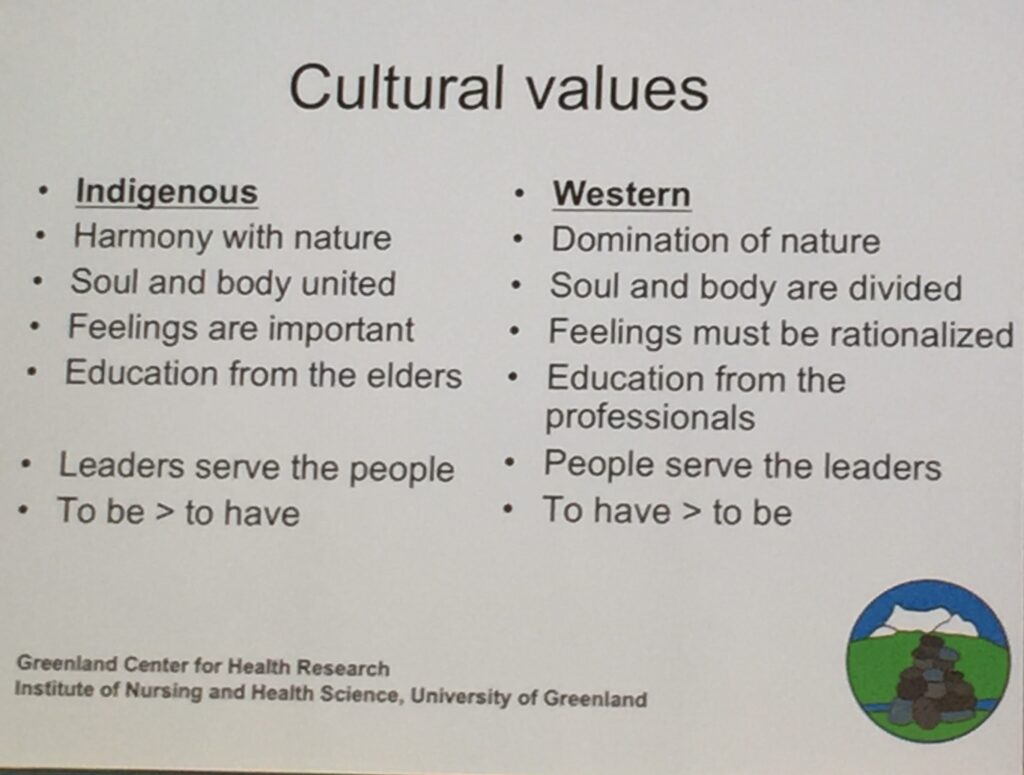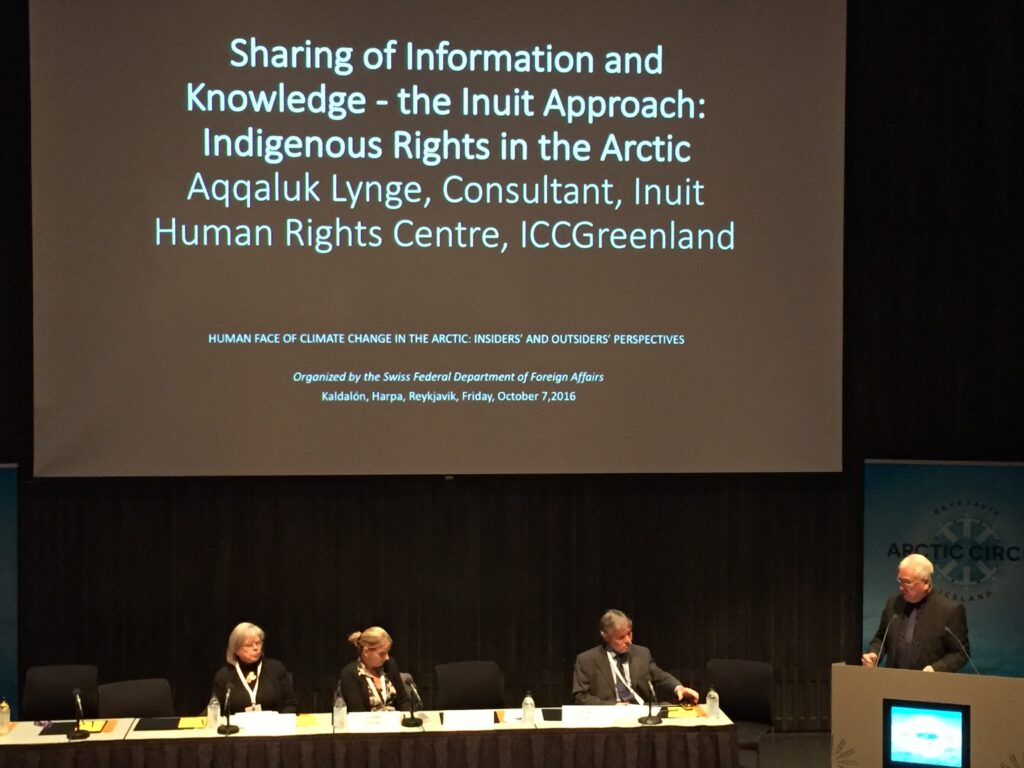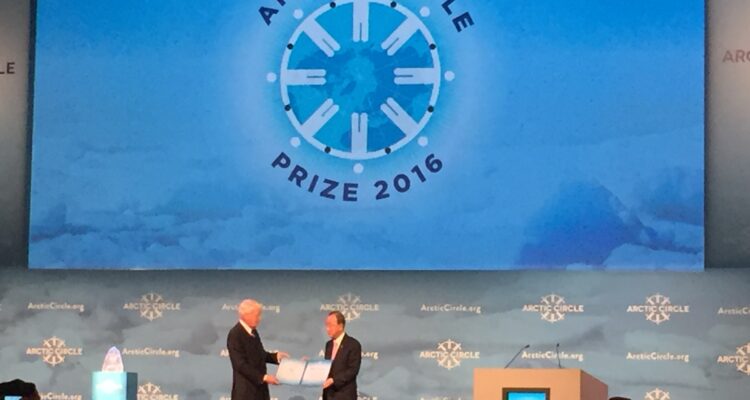I am writing this in Keflavik Airport, waiting for my flight back to Denmark, and savouring the wonderful experience of attending this weekend’s Arctic Circle 2016 in Iceland’s capital, Reykjavik. Outside the sun is shining.
Weather-wise, the Icelandic capital didn’t cooperate. The weather was awful. But otherwise Reykjavik was a most gracious host to Arctic Circle 2016, the fourth of its kind, bringing together the Arctic countries and peoples across and around the North Pole to meet, discuss opportunities, common issues and challenges. On the other hand, dramatic weather is one thing the region has in common, and in Reykjavik we had gale force winds and rain. Most predictably, the weather was unpredictable! The weekend before, Reykjavik turned off city lights in order for everyone to see the magnificent northern lights. Not so this weekend!
But inside Harpa, the beautiful harbour side opera house reigned an atmosphere of openness, curiosity and cooperation. Over 2000 participants from more than 40 countries.
This was my first Arctic Circle, but surely not my last.
Flocking Suitors
What struck me was the near feverish courting of the Arctic. Scottish first minister, Nicola Sturgeon, was a most charming suitor, struggling with the English Brexit, of which the Scots want no part. Sturgeon has her eyes set squarely beyond the British Isles, on the Arctic, Arctic Council, Nordic Council and, of course, the EU. She specifically sought closer ties with the Arctic and to support her wish, pointed to Scotland’s promotion of climate justice, clean oceans and internationalism. She talked of Scotland’s pride in close relations with the Nordic countries and the world, and efforts to continue cooperation with the EU. “We admire the idea of independent countries working together,” said Sturgeon. Also, there was talk about Scotland attempting a “reverse Greenland,” referring to Greenland’s withdrawal from the European Economic Community (EU’s predecessor) in 1985, while leaving Denmark behind, so to speak. Sturgeon’s wish, of course, is quite the opposite, to remain in the EU and have no part in Brexit.
Switzerland described herself as The Vertical Arctic and organised breakout sessions pointing to the Swiss expedition across the Inland Ice in 2012 and close observation of ice and the melting of it, as well as their newly founded Swiss Polar Institute in Lausanne. Switzerland sorely wants to become an observer at Arctic Council, their interest seeming to be mostly scientific.
Last year the major suitors were Japan and China, both of which are among Arctic Council’s 12 observer states. China focusses closely on the Arctic for a variety of reasons; e.g. shipping through the North-West Passage, which will cut costs dramatically, as well as extractive industries, be it iron ore, uranium or rare earths. One has to start somewhere, and China has individual free trade agreements with both Iceland and Switzerland (neither are EU members), and the biggest foreign mission by far in Iceland, signalling more than just polar research, of which China is indeed also very keen, in the Arctic as well as the Antarctic. Chinese have tried to buy or rent large chunks of Iceland, allegedly to build an amusement park. And rarely have I seen so many Chinese tourists as I did in the streets of Reykjavik over the weekend.
China: The Arctic should belong to no one and everyone
China is of the conviction that, like Antarctica, the Arctic really ought to belong to no one and everyone, and thus not in particular to Arctic nations and peoples. This view is interesting coming from a country fiercely protective of and certainly not willing to share what it considers its own territory, even to the extent that it refuses to respect UNCLOS, the UN’s Convention on the Law of the Sea, which China ratified over 20 years ago. Also, before becoming an observer at Arctic Council in 2013, China was only just able to contain its rage over the Inuit having a say in in the decision process. Switzerland doesn’t seem to nurture any such prejudice, respects indigenous culture and needs, and happily engages with indigenous peoples and governments alike in the attempt to gain observer status. China is unbecomingly wary of listening to original populations, be they, Tibetan, Uighur or Mongolian.
But if you consider Switzerland the Vertical Arctic, one really ought to take into account Dalai Lama’s despriction of the Tibetan Plateau as the Third Pole. There too, glaciers are melting at frightening pace.
Arctic Peoples

It was wonderful to see and meet so many Arctic peoples, Inuit, Same and more, coming together to talk, listen, learn and cooperate in an atmophere of openness and progress. This was the Arctic, through both micro- and macroscope (if such exsists), focussing on small communities with vast problems of health, suicide, education, social cohesion (or the opposite) and more. So much in common, so much to learn from one another, so much to share … And many speakers, international or local, agreed that the Arctic’s indigenous people have a way to live with nature which can save the planet, while modern Western lifestyle is at odds with nature.
Representatives of particularly Nordic space research zoomed in on connecting the Arctic, on communication and infrastructure and how to improve and create connectivity across the enormous area with huge climatic challenges – to serve the people, of course, but also science, search & rescue, surveillance, defence and business, including tourism. Low flying satellites, global broadband coverage, LEO constellation (low earth orbit), drones … all somewhere out there in the near future.
Arctic News

I attended along with friends to develop and promote the nascent Circumpolar Inuit News and Information Network, CININ, a way for Inuit to gain more control of their mutual communication, information and knowledge. We’re off to a very modest start, check us out on facebook.
And to us the tone of hastily (although it seems slow to us on the ground) developing and expanding communication channels to bridge the information gaps in any of the above ways, was indeed appealing. Interestingly, tourism in the Arctic seems to be one of the strongest drivers to promote communication. Tourists need instant access to their social media, be they on air planes or cruise ships: look at me, on top of the world! Almost whatever it takes, I am for it.
Some of the messages were hammered across from several plenary sessions: The Arctic is the weather vane for the devastation of global climate changes. Where the Amazon is the lung of the globe, the Arctic is the circulation. Even if we manage to keep rising temperatures below 2 centigrades by 2100, it will be two or three times that in the Arctic. And what happens in the Arctic, doesn’t stay there, as professor Whiteman from Canada pointed out. She also explained that every year, we are losing what equals six time the glaciers of the Alps. She did conceed that in Greenland, this doesn’t count for much. But the consequence is obvious: unless we manage to rein in the degradation, Greenland will disappear, although this will not happen in our lifetime.
The solution is cooperation, scientific, commercial, political, and living with nature instead of combatting it. We have everything to gain, and no time to lose.
Fresh from the UN, one sorely missed the Sustainable Development Goals, which holds the key to many of the Arctic’s issues. I saw one mention of them on a slide, otherwise the only speaker I heard refer to them them was UN Secretary General, Ban Ki-moon, while accepting the newly created Arctic Circle Prize in recognition of his leadership in international climate diplomacy, i.e. for his tireless efforts preceding the Paris Agreement of last year. “An act of extraordinary statemanship, courage and vision, given the political opposition” when Ban Ki-moon took office 10 years ago, said Iceland’s former president when presenting the prize.
While Iceland is a safe and inviting place, we knew that the SG was arriving when security in the beautiful Harpa was stepped up – and a sweet little bomb sniffing dog did its round on the main stage.
